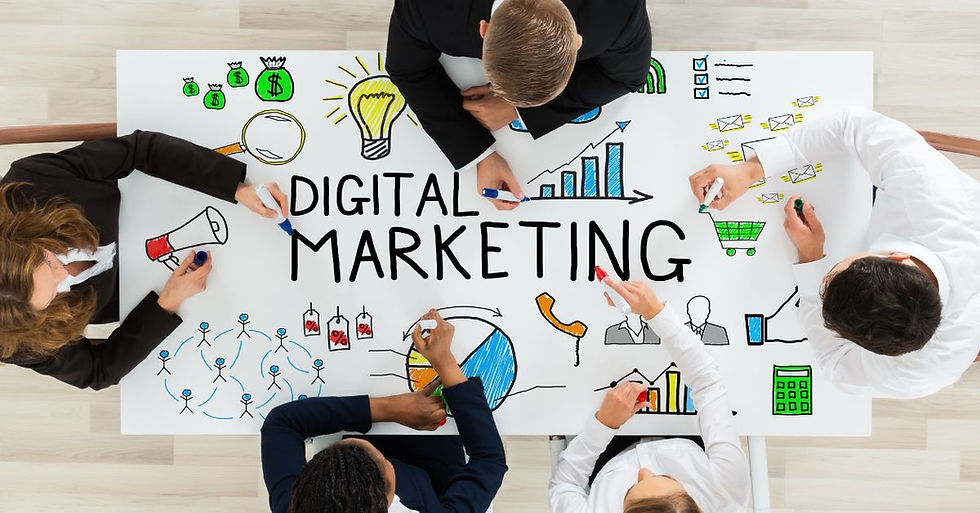Digital Marketing: Transforming the Way Brands Connect in a Digital Era
- Sophia Grace
- Aug 4, 2025
- 3 min read

In today's hyperconnected world, digital marketing has become the cornerstone of modern brand strategy. It leverages online channels to engage consumers, build awareness, drive conversions, and cultivate loyalty—often in real time. As businesses of all sizes embrace digital-first models, the role of digital marketing has expanded from a support function to a growth engine.
From search engines and social media to content marketing and email automation, digital marketing provides the tools to reach the right audience with the right message at the right time.
What is Digital Marketing?
Digital marketing refers to all marketing activities conducted through electronic devices or the internet. It encompasses a wide range of strategies, including:
Search Engine Optimisation (SEO)
Pay-Per-Click Advertising (PPC)
Social Media Marketing (SMM)
Email Marketing
Content Marketing
Affiliate and Influencer Marketing
Mobile Marketing
Analytics and Conversion Rate Optimisation
These strategies are often integrated into a unified digital marketing plan to maximize performance across multiple touchpoints.
Key Components of Digital Marketing
1. Search Engine Optimisation (SEO)
SEO involves optimizing websites and content to rank higher in search engine results. It drives organic traffic and improves visibility for relevant queries, making it foundational to any digital marketing campaign.
2. Content Marketing
High-quality content builds trust, establishes authority, and nurtures customer relationships. Blogs, videos, infographics, and whitepapers are commonly used to attract and retain audiences.
3. Social Media Marketing (SMM)
Platforms like Facebook, Instagram, LinkedIn, and X (formerly Twitter) offer targeted engagement opportunities for brand building, community management, and campaign promotion.
4. Pay-Per-Click (PPC) Advertising
PPC ads appear on search engines and social platforms, charging advertisers per click. This method delivers fast, measurable results and supports lead generation and e-commerce sales.
5. Email Marketing
Despite being one of the oldest digital strategies, email remains a high-ROI channel for personalized communication, offers, and customer retention.
6. Influencer and Affiliate Marketing
These approaches leverage trusted third parties to promote products or services, expanding reach and enhancing credibility among niche audiences.
Industry Outlook
According to the latest report by Expert Market Research (EMR), the global digital marketing industry continues to expand rapidly, driven by rising internet penetration, mobile usage, and growing e-commerce ecosystems. Businesses are allocating larger portions of their budgets toward digital channels, especially as traditional advertising methods lose ground to more trackable and interactive alternatives.
Technological advancements such as artificial intelligence, programmatic advertising, and data-driven personalization are further shaping the digital marketing landscape. The report indicates significant opportunities for innovation across sectors including retail, BFSI, healthcare, real estate, and education.
In emerging markets like India, Southeast Asia, and Latin America, the digital marketing industry is witnessing exponential growth due to a surge in smartphone users, localised content creation, and increased digital literacy.
Benefits of Digital Marketing
Cost-Effective and Scalable
Compared to traditional advertising, digital marketing allows businesses to reach a larger audience at a fraction of the cost. Campaigns can be easily scaled or adjusted based on performance.
Measurable ROI
Tools like Google Analytics, Meta Business Suite, and CRM platforms provide real-time data on campaign performance, enabling marketers to make informed decisions and optimise results.
Targeted Reach
Digital marketing platforms offer advanced targeting features based on demographics, interests, behaviour, location, and more, ensuring that marketing messages reach the most relevant audiences.
Customer Engagement
Interactive content, chatbots, and social media interactions foster meaningful engagement with customers, improving brand loyalty and lifetime value.
Flexibility and Speed
Campaigns can be launched, paused, or modified in real-time based on performance and feedback—providing unmatched agility in response to market dynamics.
Challenges in Digital Marketing
While the digital marketing ecosystem offers vast potential, it also presents challenges:
Ad Fatigue: Oversaturation can reduce engagement and brand recall.
Data Privacy Regulations: Compliance with GDPR, CCPA, and similar laws is critical.
Algorithm Updates: Changes in search and social platform algorithms can significantly impact visibility.
Content Overload: Cutting through the digital noise requires standout creative and messaging.
Skill Gaps: Staying competitive requires ongoing training in new tools and technologies.
Emerging Trends
The future of digital marketing is being shaped by several key trends:
AI and Automation: From chatbots to predictive analytics, AI is streamlining marketing efforts and improving targeting.
Voice Search Optimisation: As smart assistants gain popularity, optimising for voice is becoming essential.
Video Marketing: Short-form videos and live streaming are gaining traction across platforms.
Zero-Party Data: Collecting customer data directly and ethically is becoming a strategic focus amid third-party cookie deprecation.
Sustainability Messaging: Brands are increasingly expected to communicate their values and environmental commitments authentically.









Comments